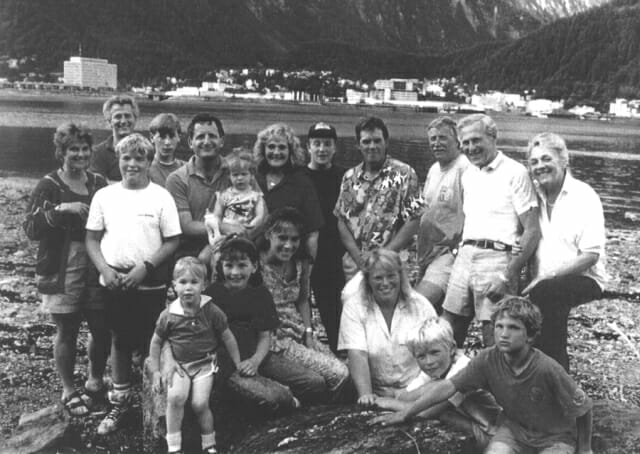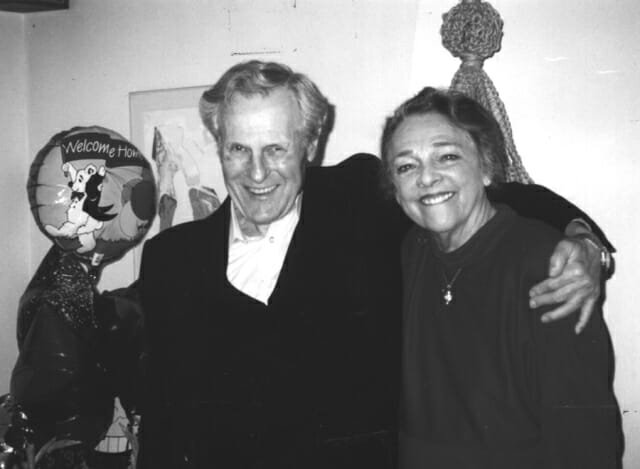Gastineau Channel Memories
Boochever, Robert and Connie
Ann Boochever and Barbara Boochever Lindh
Robert Boochever was born in Brooklyn, New York on October 2, 1917, to Miriam Cohen and Louis C. Boochever. He spent most of his boyhood growing up in Ithaca, New York, where his father was Director of Public Relations at Cornell University. Both Robert (Bob) and his brother, Louis graduated from Cornell; Bob went on to earn his Law degree from Cornell in 1941, and Louis earned a Ph.D. from Harvard.
Soon after graduation, Bob enlisted in the Army and was shipped off to remote Newfoundland where he was stationed from 1942 to 1944. There he met a tall, slender, blue-eyed nurse named Lois Colleen Maddox. Lois was an only child born to Kenneth and Flora Maddox in Decatur, Illinois on July 5, 1919. She became known to her friends as ?Connie? at the Hurley Medical Center where she graduated as a registered nurse. Bob was a first lieutenant and legal officer for the base and Connie was the chief surgery nurse. They were married on April 22, 1943.
Soon after the war, Robert heard of an opportunity to go to Alaska as an assistant district attorney. After the uncertainty and horrors of the war, Alaska seemed like an exotic adventure worth considering. The following is a portion of a transcription given in 1990 to Judge Thomas Stewart by Robert Boochever, Judge of the United States Court of Appeals for the Ninth Circuit.
?Not long after the war, a long time family friend from Cornell, Warren Caro, who had been aide to Governor Gruening, contacted Connie and me. He had been a Coast Guard officer during the war in Juneau. He wrote saying what a great place Juneau was, and that there was an opening in Juneau for an Assistant United States Attorney. Actually both the United States Attorney and his assistant had retired. There was no United States Attorney in Juneau at the time. So I went to see our then Delegate to Congress, Bob Bartlett, who was later, as you know, a very fine Senator from Alaska, and he interviewed me and recommended my appointment. The Justice Department appointed me...I had to do a little talking to convince my wife that we and our small child should head off to what was then just the wilds of Alaska about which we knew practically nothing. Connie was nice enough to say she?d go up and see what it was like and give it a try. On my daughter Barbara?s first birthday, January 16, 1946, I flew to Alaska. Connie stayed behind and was going to come up after I?d found a place to live.
?Coming to Alaska, I flew up in a DC3. Juneau was ?socked in? with a heavy snowstorm, and we flew through the White Pass which was appropriately named at the time. Couldn?t see a thing! If I knew what the conditions were at the time, I?d have been really frightened. We made it through the pass and landed in Whitehorse, Yukon Territory. Pan American Airways was the only carrier flying to Juneau. One of the people on the plane was Bill Ray who was coming back to Juneau after service in the Navy. He was to become a good friend and eventually a prominent state senator for many years. We overnighted in Whitehorse. It was about 30 degrees below zero, and the next day we worked our way into Juneau. That was my arrival!?
Bob?s first case as Assistant U.S. Attorney was an unsolved murder that took three weeks to try. He won the case. According to Connie, their first year in Juneau was unusually dry and sunny; the beauty of the area coupled with the opportunities of a growing territory resulted in their decision to stay. And stay they did for the next 40 years! The Boochever family grew to include four daughters, Barbara, Linda, Ann and Mimi.
Bob went on to join the law firm of Faulkner and Banfield where he soon became a partner and Boochever was added to the firm?s name. According to law firm partner, Michael M. Holmes, ?He was considered the best trial lawyer in Alaska.? Bob was the first chairman of the Juneau Planning Commission and served in that capacity for many years. Shortly after statehood, efforts were made to move the capital from Juneau to the Anchorage area. He was a leader of the opposition arguing against the initiative in the courts and traveling throughout the state in a successful campaign to keep Juneau the capital of Alaska. Bob was also active in securing a southeast branch of the University of Alaska at Juneau. Many people remember Bob as a very courteous gentleman who always tipped his hat to women when he met them on the streets.
In 1972, Bob was appointed to the Alaska Supreme Court where he served for eight years, three as Chief Justice. Since Alaska had only been a state for 14 years, there was only a small body of case precedent. Boochever and his four fellow justices had a chance to be pioneers in the law.
During this time, as their children grew older and more independent, Connie began to focus her formidable energies on making Alaska a cultural center of which all could be proud. With the help of Juneau residents George Rogers and Sharon Lobaugh, she worked to establish the State Arts Council in the mid 1960?s. She then served as a governor?s appointee on the Arts Council for 11 years, eight as chair or co-chair. She also was instrumental in starting the Juneau Arts and Humanities Council for which she served as the first president. And, she was a founding member of the Juneau Douglas Little Theater for which she was twice president. She also served as a board member of Arts Alaska and the Alaska Repertory Theater and still found time to serve on the board and as vice president of the National Assembly of State Arts Agencies.
Rogers and Lobaugh both admired Connie?s ability to present arts issues in a credible and forceful manner to skeptical legislators. One program she lobbied for was One Percent for Art, which mandates a percentage of the capital costs for new state buildings be set aside for art. Sharon Lobaugh said, ?Where artists might have a harder time presenting issues politically, Connie Boochever was astute. It took probably ten years to pass that bill, and she kept up a strong effort. I remember her extreme dedication.?
Although Connie?s support for the arts was broad based, her first love was theater, and she was very active in initiating theater in Juneau. She produced, directed and acted in the long running seasonal show for tourists called ?Hootchinoo and Hotcakes? written by Carol Eastaugh, a collaborator and close friend for many years, who preceded Connie in death by just a month. The production was sponsored by the Juneau Chamber of Commerce and performed in Last Chance Basin. Judge Tom Stewart, a close family friend, said Connie Boochever was a prime mover in restoring and developing the Last Chance Basin historic mining buildings as part of that production. The site is now a mining museum.
It was that same determination and drive that was behind her push to save the organ that we all enjoy now in the State Office Building. The organ had been used for the early silent movies in the old Coliseum Theater located on South Franklin before it burned down in the late 1930?s. When the organ was no longer needed, it suffered years of neglect. When Connie heard that it had been taken to the garbage dump she launched the ?Save the Organ? campaign.
In 1980, at the age of 63, Justice Boochever was appointed by President Carter to be the first Alaskan ever to sit on the San Francisco-based US Court of Appeals for the Ninth Circuit. There he became known as a champion of individual rights and according to Boochever, also a sympathizer with law enforcement problems. In a Juneau Empire article about him in July 2000, he explained, ?I don?t like to see cases go off on technicalities if they?re not issues involving constitutional rights.?
He is also an outspoken opponent of capital punishment. Boochever stated, ?It?s hard for people to understand that to convict a person, there must be proof beyond a reasonable doubt, which is the cornerstone of our system. I realize some people commit horrible crimes, but I don?t see why they can?t be locked up for the rest of their lives. I think the cost of making sure one does not execute the wrong person, which does happen, far exceeds the cost of interring a criminal for the rest of their life.?
Both Bob and Connie were recognized during their years of civic service to Juneau and Alaska. They were both selected by the Juneau Rotary Club as Man and Woman of the Year and they received numerous legislative citations as well. Connie received the prestigious Governor?s Award for the Arts and more recently Bob was honored with a Chair endowed and named for him at the University of California School of Law in Davis, California. The Chair was endowed to perpetuate the principals for which Judge Boochever has become known for in his body of legal work and which are considered essential values for a great Republic: 1) the freedom of conscience as expressed in the First Amendment; 2) the promise of fairness made in the Fifth and Fourteenth Amendments; and 3) the principle of equality as expressed in the Fourteenth Amendment.
The Boochever children continue to be active in Alaska. Barbara?s husband Craig Lindh was instrumental in selecting the present site of Eaglecrest, Juneau?s community ski area. Barbara served as Ski Club president and chair of the John and Deena Hale Ski Foundation. Their daughter, three-time Olympic downhill ski racer Hilary Lindh, won a Silver medal in the 1992 Winter Olympics in Meribel, France and two World Championship medals, Bronze in 1996 and Gold in 1997. She retired from the US Ski Team after winning the National downhill and Super G titles in 1997. Linda and husband, internist Dr. John Schwartz reside in Anchorage where Linda has managed several businesses including a prominent advertising agency and more recently a market research firm. They have four children, Andrea, Lael, Quinn, and Jamie. Mimi and husband Woody Walker live in Juneau where Mimi has been nationally recognized for her innovative approach to integrating fine arts into her kindergarten/first grade curriculum. They have two sons, Jessie and Ian. Ann, a music teacher at Auke Bay Elementary School, also lives in Juneau where she and husband Scott Miller, the founder of two notable Juneau restaurants (the Fiddlehead and Luna?s), collaborate in writing and performing numerous musical plays and songs for children and adults. They have four children, Zachary, Liorah, Megan and Spencer.
 |
Boochever family. |
 |
Robert and Connie Boochever. |
